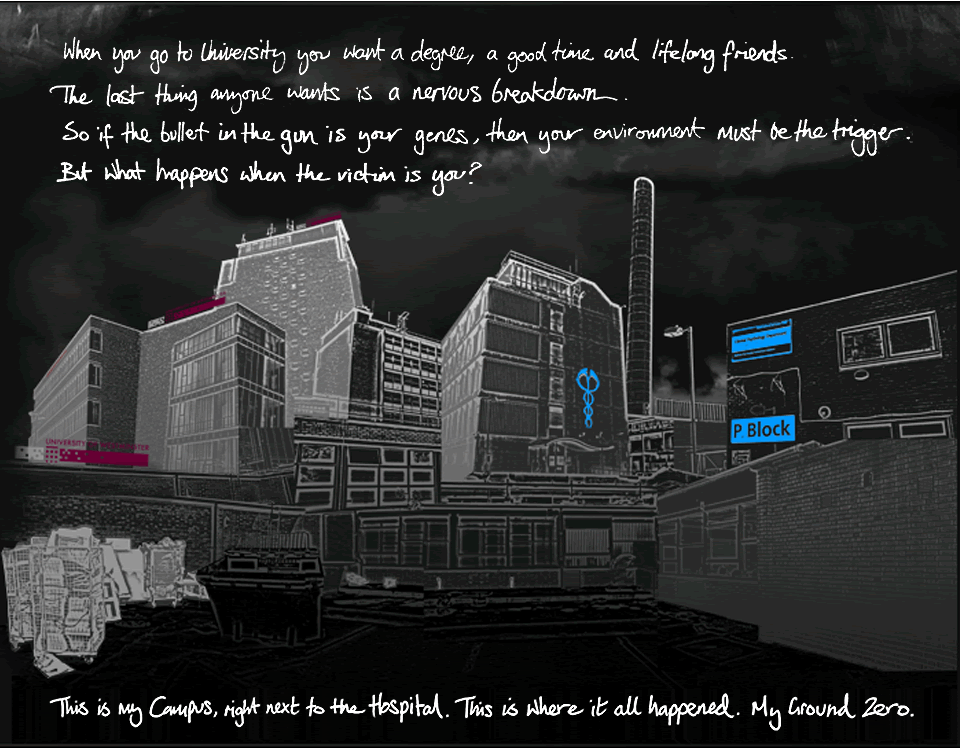












Hypomanic Mad In England tells a remarkable story of the mind-expanding world of university life in the 1990's, the resulting tragedy of madness and subsequent recovery.


Watch the trailer
University.
It'll make or break you.
An ambitious undergraduate's work hard, play hard attitude spirals into delusional behavior via a cocktail of alcohol, drugs and caffeine. After a resulting nervous breakdown he finds himself sectioned on a psychiatric ward faced with the ordeal of getting his life back.
Buy the book >
Synopsis
Read the Blog >
Hypomanic Mad In England is a story that goes beyond hedonism to embrace the human tragedy of madness. It is a brutal and affecting account of the struggles of balancing university life and the personal battles we must face in the sophomoric stages of our lives.
In 1995 aged twenty-three, Victor J Kennedy is a highly motivated, final year Information Design student at The University of Westminster. He is top of his class and is putting the finishing touches to a breakthrough computer operating system idea he has created which he believes is the future of location-based navigation. On campus Victor is an integral member of the university football team and in love with his beautiful girlfriend Tanya. He has many friends and few enemies, at least that's what he thinks.
It is the time of year for handing in 10,000 word dissertations and like other students, Victor uses both recreational and across the counter drugs to keep up with both his strenuous social and academic lifestyles. It his burning ambition for a better future which drives Victor towards the risk-oriented strategy of inducing insomnia to get ahead in life. This final choice precedes a life-changing mental collapse.
We follow Victor's thought processes through his interactions with the student community at The University of Westminster at the Harrow campus in Northwick Park. He has a deepening sense of dislocation and bewilderment. We witness the exchanges with family, friends and enemies, as he spirals towards critical mass. We'll understand the crucial role these close relationships play in that young mind's seemingly unstoppable trajectory into madness.
The story explodes on a fulcrum of chaos and confusion as firstly, his college sweetheart Tanya collapses on campus with an ectopic pregnancy. Then in the hospital she confesses to a long-term affair due to the neglect caused by Victor's recent obsession with work. A future without Tanya in it was too hard to bear. Beset by creeping and bizarre delusions, Victor's behavior goes so awry it results in a dramatic early morning stand off with the Police at Tanya's student digs. After being arrested, Victor suffers a devastating nervous breakdown and is legally incarcerated in a psychiatric ward under the mental health act. The psychiatrists put Victor on a 28-day section with the diagnosis of 'a stress induced hypomanic episode.' The remainder of the book documents Victor's suffering and courage to recover, how he gets back on his feet and over his broken heart.
About the author
25 years later




What is Hypomania?
Hypomania is a mood state characterized by persistent and pervasive elated or irritable mood, and thoughts and behaviors that are consistent with such a mood state. It is distinguished from mania by the absence of psychotic symptoms and by its lower degree of impact on functioning. Hypomania is a feature of some mood disorders, such as bipolar II disorder and cyclothymia.
Hypomanic episodes
A hypomanic episode includes, over the course of at least 4 days, three or four of the following symptoms, depending on whether the predominent mood state is elation or irritability: inflated self-esteem or grandiosity; decreased need for sleep; being more talkative than usual or feeling pressure to keep talking; flight of ideas or the subjective experience that thoughts are racing; distractibility; increase in goal-directed activity or psychomotor agitation; and excessive involvement in pleasurable activities that have a high potential for harmful consequences.
Possible benefits of Hypomania
People with hypomania are generally perceived as being energetic, euphoric, overflowing with new ideas, and sometimes highly confident and charismatic, and unlike full-blown mania, they are sufficiently capable of coherent thought and action to participate in everyday activities.
John Gartner's The Hypomanic Edge (Simon and Schuster) contends that notable "Americans" including Christopher Columbus, Alexander Hamilton, Andrew Carnegie, Louis B Mayer, and Craig Venter (who mapped the human genome) owe their innovativeness and drive, as well as their eccentricities, to hypomanic temperaments. Gartner suggests that the constructive behaviors associated with hypomania may contribute to bipolar disorder's evolutionary survival.
Treating Hypomania
It is unknown to what degree hypomanic symptoms can occur without a depressive component.
Patients may be relatively unlikely to seek psychiatric treatment for hypomania alone. However, many hypomanic patients experience disrupted sleep patterns, irritability, racing thoughts, obsessional behavior, and poor judgment. Hypomania is also associated with impulsiveness, recklessness, excessive spending, risky sexual activity, and other out-of-character behaviors that the patients may regret following the conclusion of the mood episode. Hypomania can signal the beginning of a more severe manic episode, or it often directly precedes a depressive episode.
Virtually all clinical trials of medications for the non-depressive phases of bipolar illnesses involve treating patients for severe mania during the acute (initial) phase of mania. Recommended medication doses are based on these trials, in which case high doses are justified in order to remove the patient from immediate danger. Treating hypomania, however, involves different considerations and may demand greater clinical judgment
What is Bipolar Disorder?
Emotional highs and lows are part of life for everyone. But for someone with bipolar disorder, these ups and downs can be so extreme they can interfere with daily life. Sometimes they can even be dangerous. One day a person with bipolar disorder may feel so depressed that they can't get out of bed. Work may seem impossible. On another day that person may feel great, full of endless energy and creativity. But other people might think that their actions are reckless and out of control. Bipolar disorder is a lifelong medical condition that can be confusing and unpredictable, but it's nothing to be embarrassed about. Learning more about bipolar disorder can be helpful in managing this medical illness.
Bipolar disorder is a serious medical illness that can affect a person's ability to feel a normal range of moods. People with bipolar disorder have mood swings that can range from very low (depression) to very high (mania).
Bipolar disorder is also known as manic depression. The word "bipolar" is now used because the disorder is made up of two poles, or extremes. For example, picture a globe. The North Pole would be mania, and the South Pole would be depression. Every time a person experiences symptoms of one pole for a specific period of time, it is called an episode.

HYPOMANIC and all HYPOMANIC character names and distinctive likenesses thereof: TM & © Victor J Kennedy.
All Rights Reserved. HYPOMANIC: Trademarks registered in the UK and certain other countries.
Chipmunkapublishing are the essence of Mind, Body and Soul publishing.
© 2007 Victor J Kennedy. Track Ebeneezer Goode TM & © 1992 Colin Angus & The Shamen